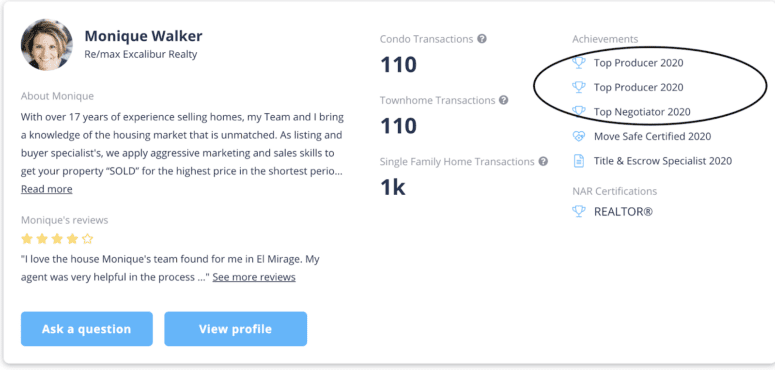What Does It Mean to Be a Top Producer in Real Estate?
- Published on
- 6 min read
-
 Melissa Rudy Contributing AuthorClose
Melissa Rudy Contributing AuthorClose Melissa Rudy Contributing Author
Melissa Rudy Contributing AuthorMelissa Rudy is a seasoned digital journalist with 15 years of experience writing web copy, blog posts and articles for a broad range of companies. When she can’t buy or sell homes, she settles for the next-best thing: researching and writing about all things real estate-related.
“Austin’s top real estate agent!”
“Top 1% of Chicago agents!”
“Top producer in the New York Tri-State region!”
When you see these types of proclamations on a real estate agent’s for-sale sign or website, it can come off as an empty sales tactic. Or you assume that the agent must be the kind who hosts extravagant open houses on Million Dollar Listing. What does achieving “top producer” status in real estate mean, and what relevance does it have to your agent search?
With over 2 million active real estate agents across the nation — and thousands in huge housing markets like San Francisco, Boston, and Atlanta competing over a limited number of listings — professionals in the industry use rankings to stand out from their competition and showcase their experience. However, the methodology behind these rankings isn’t always presented clearly to buyers and sellers.
This guide will dispel any confusion you have around how “top of market” is measured and the ways in which brokerages and various organizations go about identifying top producers. We’ll also offer guidance on how to tailor your agent selection beyond the singular “top or not” benchmark.

What makes someone a ‘top producer’?
To understand how agents can qualify as top producers, it’s helpful to know how they get paid. In a typical transaction, the listing agent will charge their seller a commission that amounts to 5.8% (we’ll round up to 6% for simplicity) of the property’s sale price. That commission usually gets split 50/50 with the buyer’s agent. In effect, each agent takes home a cut of about 3%, though an additional portion will go toward paying brokerage fees.
Within this commission structure that depends on deals closing, agents have a few main avenues to become a top producer. They can either sell more homes than their peers, sell more expensive homes than their peers — or both.
An agent can work with both buyers and sellers and be a top producer. However, as agents gain experience, they tend to “graduate” into taking on more listings than buyer clients. Here are the main metrics used to identify top producers in the real estate industry:
Transaction sides
An agent earns a transaction side when they help either a buyer or seller close a deal. According to the National Association of Realtors, the median number of transaction sides in 2020 was 10 units per Realtor®, or less than one per month. The number of transaction sides required to become a top producer at a particular brokerage or in a certain area depends on the individual benchmarks they’ve set.
Units sold
This is the total number of properties sold annually, so it excludes buy-side transactions. Eva Cedillo, a San Joaquin County, California real estate agent specializing in single-family homes, says that in her market, a top producer should sell at least 100 houses per year. In other markets and real estate offices, the top producing threshold could be more like 40-50 homes per year.
Gross commission
Gross commission is calculated by multiplying the sale price of the home by the share of an agent’s commission rate, then adding together their total commissions for a particular time period (usually one year).
In this sense, gross commission is the metric that most closely represents an agent’s actual earnings. According to the Bureau of Labor Statistics, the median annual earnings for agents was $49,040 as of May of 2020. By contrast, the top 10% of agents earned more than $112,410. Top agents can earn much more than that, particularly in higher-priced areas like Los Angeles, where the average home price is $810,372.
For example, if an agent sold 10 homes in Los Angeles at the median local price of $810,372 and took home a 3% commission each time ($24,311) their yearly gross commission would amount to $243,110. That would put the agent at a much higher income than average nationwide, despite doing an average number of transaction sides.
Sales volume
Sales volume represents the total sales price of all closed properties in any given year. For an agent selling an average of 12 units at the median U.S. home sale price of $355,900, that would equate to an annual sales volume of $4,270,800. Benchmarks for what qualifies as “top producer” sales volume will also vary by market since prices can vary so widely. In Sacramento, California, for example, a real estate agent must sell $5 million in real estate volume to qualify for the “Masters Club,” but in Iowa, an agent only needs to hit the $1 million mark to receive an individual achievement award.

Who identifies top producers?
A few of the key organizations that rank real estate agents and hand out the “top producer” badge include local real estate associations, individual real estate brokerage offices, media outlets and independent ranking firms, and real estate technology companies such as HomeLight that offer agent-matching services to buyers and sellers.
Real estate associations
Across the U.S, there are more than 4,700 real estate associations, which are trade groups that serve as support systems for agents and brokers. The National Association of Realtors is the biggest, with members from all across the country, but almost every city has its own local organization, each with its own methods of determining who qualifies as a top agent.
- Chicago, Illinois: The Chicago Association of Realtors gives annual sales awards to any agent who has a minimum of $11 million in sales volume and/or sells at least 30 units.
- Atlanta, Georgia: Each year, the Atlanta Association of Realtors recognizes the top 15% of its members in terms of volume of transactions and/or sales.
- Raleigh, North Carolina: To join the association’s Top Producers Council, members must produce at least $10 million in gross sales OR at least 50 transactions.
- Ohio: The Ohio Realtors Association names its top-performing members to the President’s Sales Club Award, with various levels based on $1 million in sales volume or 25 transactions, $2.5 million or 50 transactions, $5 million or 75 transactions, and $7.5 million or 100 transactions.
Brokerages
Licensed real estate brokers can create their own brokerages and hire agents to work for them. Each brokerage typically has its own method of ranking the performance of its agents.
- Coldwell Banker gives awards to individual agents and offices that achieve the highest adjusted gross commissions and total units sold.
- Each quarter, Keller Williams recognizes its top 100 agents based on gross commission income and number of units sold.
- RE/MAX recognizes its 100 top-performing agents based on commission totals.
Press and independent ranking firms
There are several industry news outlets and real estate companies that rank agents on a national level:
RealTrends
Since 1987, this real estate organization has been one of the top sources of news and information on the residential brokerage industry. It publishes several yearly industry rankings, including:
- Real Trends 500: featuring the top-performing real estate brokerage firms in the country, ranked by closed transaction sides and sales volume, among other criteria
- The Thousand: measuring the top U.S. real estate professionals and teams by transaction sides and sales volume
- America’s Best: ranking the top real estate agents by state based on number of transactions
Real estate publications
Publications like Top Agent Magazine feature the top-producing agents in the U.S. and around the world. Its Top Agent Editions break out the top 1% of featured agents in individual U.S. states and other countries. For example, you can click to view the top agents in Texas, then drill down to read detailed bios of each agent.
HomeLight Achievements
Each year, HomeLight announces the top 5% of real estate agents across the country based on verified housing market data through our HomeLight Achievements program. We release three types of awards:
- Top Producer: top 5% of agents in the area based on total sales volume
- Sells Homes Fast: top 5% of agents in the area based on average days on market for seller side transactions
- Top Negotiator: top 5% of agents in the area based on sale-to-list ratio for buyer and seller side transactions.
When ‘top’ meets ‘tailored’, magic happens
It’s great to work with an agent who has a proven track record in your market — but it’s even better to work with one who has successfully sold homes similar to yours. That means the best agent for you might not be the same one who sold your friend’s, co-worker’s, or cousin’s home.
Word of mouth might work great for finding a handyman or a mechanic, but it could fall short when it comes to finding an agent who is intimately familiar with your type of home, your neighborhood, and the surrounding community.
At HomeLight, we use a unique agent matching platform to help you find not only the best agent, but the best agent for you. Don’t get us wrong: Agents work hard to sell as many units (and as much volume) as possible, and it’s important to highlight those numbers. But we also dig deeper to look at the variables that are specific to your needs:
How many houses has the agent sold within a small radius of yours?
An agent with firsthand experience in your neighborhood will have more knowledge of recent sales comps, market trends, and what buyers are looking for in your area.
How many houses has the agent sold in your price point?
A buyer looking at million-dollar listings will have different criteria and motivations than someone who’s looking to spend $300,000. An agent with experience in your price point will have a better sense of how to attract your target buyers.
What percentage of the agent’s sales have been over the listing price?
The no. 1 goal for most people selling a home is to maximize value. An agent’s sale-to-list price ratio will tell you how much, on average, they get for the homes they sell compared to the asking price. For example, if a house is listed at $300,000 and sells for $330,000, the sale-to-list ratio would be 110%. The ratios can vary depending on location and inventory, but generally speaking, higher ratios bode well for an agent’s ability to attract and negotiate strong offers.
Does the agent have any special certifications and specializations?
Need to sell a home under probate? Looking to list a waterfront home, a condo, a tract of vacant land, or another unique type of property? HomeLight makes it easy to find agents who have certain types of expertise to handle these non-cookie-cutter types of transactions. When creating your list of matched agents, our system factors in any specializations or certifications on their profiles, such as “Title and Escrow Specialist,” “Cash Close Specialist,” “Luxury Specialist,” and more.
Does the agent have hyper-local expertise?
Yes, an agent’s job is to sell your house — but it’s also her job to sell your street, the park down the block, and even the cozy corner coffee shop. They should also be able to point buyers to key resources when they have questions about local school districts and crime rates. An agent who is a cheerleader for your community, and intimately familiar with its nooks and crannies, will be more apt to make your listing shine. Look for the “Neighborhood Knowledge” designation on agent profiles.
Does the agent have the support of a team?
Cedillo believes that a real estate agent is only as successful as the team supporting her. “At a restaurant, one person can’t be the maître d, the chef, and the bartender,” she says.
“The same goes for a real estate professional. Make sure they have a strong staff to back them up.”
If they don’t have a team, will they have enough bandwidth for you?
One thing to know about top producers is that they are busy. However, great agents know how to juggle multiple listings without letting the ball drop on any single client. If your agent isn’t part of a team, you may receive more personalized attention from the listing agent rather than work with several team members, which may be preferable if you have a strong bond with him or her. Just make sure they aren’t leaving you on “read” early on, which could be a sign of bad communication.
As you search for a real estate agent to sell your home, you look for certain qualities. This person, ideally, should bring a ton to the table. Knowledge about the market, great communication, and the expertise to navigate challenges like an inspection red flag or last-minute buyer request will be essential. So does an agent who claims to be “Austin’s top real estate agent” or a “top producer in the New York Tri-State region” make the cut?
Choosing a top producer can lead to top results — but the key is to find someone who’s not only outperforming in their market, but also has a proven track record of success in similar sales. Neighborhood expertise and a down-to-earth demeanor may not be what agents are technically ranked on, but qualities that go beyond an agent’s flashy sales numbers will matter when you’re in the thick of it and need someone you can trust.
Header Image Source: (ben o’bro / Unsplash)

